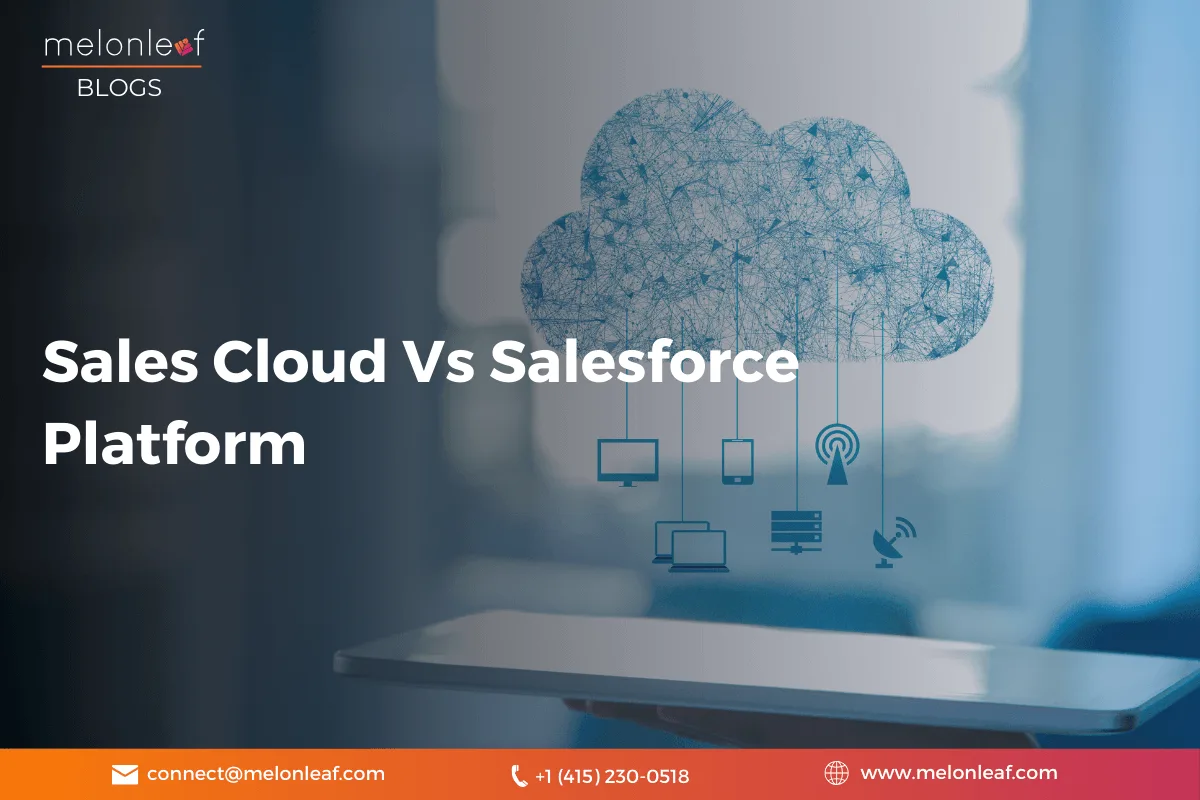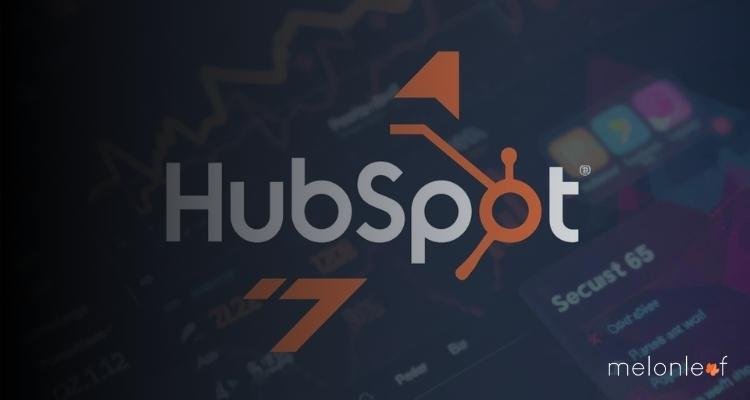If you’ve ever wandered into the world of Salesforce, you’ve likely come across terms like Sales Cloud and Salesforce Platform. At first glance, they seem similar, both are part of Salesforce, both promise to help businesses grow, and both claim to be indispensable. But are they the same thing?
Not quite. Imagine you’re running a company with a growing sales team. You need a system to track customer interactions, manage deals, and make selling more structured. That’s where Sales Cloud comes in, it’s a ready-to-use sales solution designed specifically for teams focused on closing deals.
Now, let’s say your business expands, and you need more than just a sales tool. You want to create custom applications, automate workflows across departments, and build a CRM that’s customized to your unique business model. That’s when Salesforce Platform becomes essential, it’s a foundation that lets you build and customize solutions beyond just sales.
But how do you decide which one fits your business best? Let’s break it down.
What is Salesforce Platform?
Now, let’s talk about Salesforce Platform. Unlike Sales Cloud, which comes with pre-built sales tools, Salesforce Platform is an open development environment that lets businesses create their applications, automate processes, and extend Salesforce beyond sales. Think of Salesforce Platform as a blank canvas where businesses can build exactly what they need, whether it’s:
- A custom CRM for industries beyond sales, like healthcare, real estate, or finance.
- Internal applications for HR, finance, operations, or customer service.
- Automation tools to streamline approvals, workflows, and data entry.
- Integrations with third-party tools, ERP systems, or legacy software.
- AI-powered analytics that provide deeper insights beyond traditional reporting.
Who is Salesforce Platform for?
- Businesses that need a custom CRM or applications beyond standard sales processes.
- Companies looking to automate workflows across departments (not just sales).
- Organizations with a development team or IT resources that can build custom applications.
Salesforce Platform is about flexibility and control. If Sales Cloud is like buying a pre-designed office, Salesforce Platform is like getting a space where you can build exactly what you want.
What is Sales Cloud?
Sales Cloud is Salesforce’s flagship product designed for sales teams. Think of it as a well-organized toolkit that helps sales reps track leads, manage opportunities, and close deals. If you run a business where sales teams work hard to bring in new customers and maintain relationships with existing ones, Sales Cloud becomes the go-to solution.
What’s inside Sales Cloud?
- Lead Management: Track potential customers from the first interaction to conversion.
- Opportunity Management: Monitor deals as they move through different sales stages.
- Account and Contact Management: Store all customer-related details in one place.
- Sales Automation: Reduce manual data entry and focus more on selling.
- Reports and Dashboards: Get real-time insights into sales performance.
- Forecasting Tools: Predict future sales based on past trends.
Who is Sales Cloud for?
- Sales teams looking for an organized and efficient way to manage their pipeline.
- Businesses that want a structured CRM without needing heavy customization.
- Companies that prefer a plug-and-play solution to improve their sales process.
It’s an out-of-the-box solution. You get everything set up, and your sales team can start working without waiting for developers to build custom software. Check out our in-depth Salesforce Sales Cloud Guide for a detailed dive!
Key Differences Between Sales Cloud and Salesforce Platform
Choosing between Sales Cloud and Salesforce Platform is not about picking the “better” option, it’s about selecting the one that fits your specific requirements. Below, we highlight the major differences to help you make the right decision.

1. Primary Functionality and Focus
Managing the sales pipeline from lead generation to deal closure requires a specialized approach, and that’s where Sales Cloud excels. With prebuilt features like opportunity tracking, contact management, and sales forecasting, it is designed for sales teams. On the other hand, the Salesforce Platform serves as a powerful development environment, allowing businesses to create applications and automate operations across various departments, extending its use far beyond sales functions.
2. Scope of Use
Sales professionals, business development teams, and sales managers rely on structured workflows to track leads and manage the sales cycle efficiently, precisely what Sales Cloud offers. Meanwhile, the Salesforce Platform is built for IT teams, developers, and businesses seeking to create custom applications that bring together operations across different business units.
3. Customization Capabilities
Adjusting CRM processes to fit sales teams’ unique workflows is possible within Sales Cloud, offering dashboard modifications, automated sales tasks, and personalized reports. However, the Salesforce Platform takes customization to another level, allowing organizations to develop entirely new applications, automate workflows across multiple departments, and connect third-party solutions to address complex business needs.
4. Prebuilt Features vs. Custom Development
Businesses that need a ready-to-use CRM solution with built-in sales management tools will find Sales Cloud easy to deploy and adopt. In contrast, the Salesforce Platform requires strategic planning and development but provides extensive tools for building custom applications, integrating diverse data sources, and automating specific business processes.
5. Automation
Optimizing sales processes through automation, such as lead assignments, deal stage progression, and follow-up reminders, is a core strength of Sales Cloud. For companies looking beyond sales automation, the Salesforce Platform supports automated workflows across HR, finance, IT service management, and other business functions.
6. AI and Analytics
Using AI-driven insights, Sales Cloud integrates Salesforce Einstein to provide predictive forecasting, opportunity scoring, and automated recommendations suited for sales teams. In comparison, the Salesforce Platform offers flexibility to embed AI capabilities into custom applications, providing deep analytics and intelligent automation across multiple business areas.
7. Integration Possibilities
Connecting with marketing automation tools, customer service platforms, and third-party sales applications is built into Sales Cloud. The Salesforce Platform, however, offers broader integration capabilities, linking enterprise systems, external databases, and industry-specific applications for a more unified and efficient business ecosystem.
8. User Experience and Accessibility
Designed for sales teams, Sales Cloud offers an intuitive interface optimized for managing leads, contacts, and deals with minimal effort. Meanwhile, the Salesforce Platform allows businesses to create customized user experiences built for different departments, offering flexible accessibility across various applications.
9. Pricing and Licensing Considerations
Subscription costs for Sales Cloud are based on the number of users and sales-specific features, making it an affordable solution for sales teams. The Salesforce Platform, on the other hand, follows a pricing model that varies depending on customization, development complexity, and integration requirements, making it suitable for businesses with broader operational needs.
10. Scalability and Business Growth
Expanding sales operations efficiently is easier with Sales Cloud, making it a strong choice for growing sales teams. However, businesses aiming to scale their entire technological infrastructure, automate workflows across multiple departments, and build interconnected applications will benefit more from the Salesforce Platform’s extensive customization and growth options.
Sales Cloud vs. Salesforce Platform: Which One is Right for You?
Choosing between Sales Cloud and the Salesforce Platform depends on your business needs. If your primary focus is optimizing sales processes, managing leads, and improving sales efficiency, Sales Cloud offers a ready-made solution. However, if you need a flexible platform to build and automate business processes beyond sales, the Salesforce Platform provides the tools to create customized applications
Choose Sales Cloud If:
- The primary need is a CRM for sales teams with structured deal tracking.
- You want a quick, plug-and-play solution that requires minimal setup.
- There is a lack of resources to build custom applications.
Choose Salesforce Platform If:
- The requirement for custom applications for different business functions beyond sales.
- You have an IT team or developers to build and maintain the system.
- A need to have full control over workflows and automation.
Can you use both?
Yes! Many businesses start with Sales Cloud to manage sales operations and later adopt Salesforce Platform to create a more integrated system that connects various departments.
Consult Salesforce Experts like Melonleaf Consulting for Salesforce Integration.
Selecting the right Salesforce solution is just the first step. Proper implementation, customization, and integration require expertise to maximize value. Melonleaf Consulting specializes in Salesforce Solutions, helping businesses implement the right tools efficiently. Whether you’re looking for Sales Cloud setup, custom applications, or system integration, our certified experts can guide you through the process.
Wrapping Up
Both Sales Cloud and the Salesforce Platform offer immense value, but their effectiveness depends on your business needs. While Sales Cloud helps sales teams with built-in CRM tools, the Salesforce Platform provides a foundation for innovation and scalability across departments. Choosing the right solution isn’t just about features, it’s about aligning technology with your business goals.
If you’re unsure which option is right for you, trust Melonleaf Consulting to be your Salesforce Partner. Our team can assess your business requirements and deliver a Salesforce solution that drives efficiency and growth. Get in touch today to explore how Salesforce can work for you.












